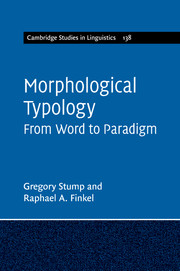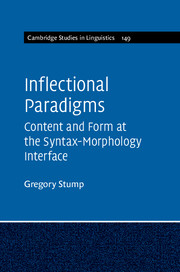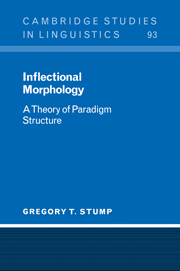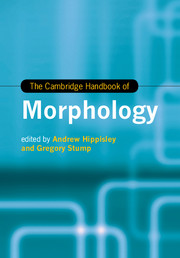Morphological Typology
From Word to Paradigm
£36.99
Part of Cambridge Studies in Linguistics
- Authors:
- Gregory Stump, University of Kentucky
- Raphael A. Finkel, University of Kentucky
- Date Published: June 2016
- availability: Available
- format: Paperback
- isbn: 9781316604779
£
36.99
Paperback
Other available formats:
Hardback, eBook
Looking for an inspection copy?
This title is not currently available on inspection
-
In this radically new approach to morphological typology, the authors set out new and explicit methods for the typological classification of languages. Drawing on evidence from a diverse range of languages including Chinantec, Dakota, French, Fur, Icelandic, Ngiti and Sanskrit, the authors propose innovative ways of measuring inflectional complexity. Designed to engage graduate students and academic researchers, the book presents opportunities for further investigation. The authors' data sets and the computational tool that they constructed for their analysis are available online, allowing readers to employ them in their own research. Readers can access the online computational tool through www.cambridge.org/stump_finkel.
Read more- Explains the functions of the Principal-Parts Analyzer (PPA), a computational tool designed by the authors
- Readers can use the PPA online for free to do further analysis of language data sets
- Proposes a strikingly new approach to morphological typology
- Gives readers new and explicit methods for the typological classification of languages
Reviews & endorsements
'A highly interesting new approach to morphological typology based on a formalized measure of the complexity of inflectional systems. An essential contribution to theoretical morphology and to research on linguistic complexity.' Matti Miestamo, Stockholm University
See more reviews'In this illuminating and timely investigation of inflectional systems, Stump and Finkel combine theoretical rigour with practical implementation, to provide a range of measures of complexity and an original typology.' Greville G. Corbett, University of Surrey
'Periodically a book is published which offers such an original perspective that it seems we have never really understood what we thought we knew: this is likely that kind of book for many readers. The cross‐linguistic study of complex morphological systems is establishing the crucial status of words and paradigms in providing insights about natural language organization. With characteristically careful rigor and clarity, Stump and Finkel introduce a new way of analyzing and typologizing inflectional systems. While developing their model would have been enough, the book takes on an even greater dimension as they explicitly explore ways of synthesizing their perspective with recent competing models. Stump and Finkel cause us to pause and consider a new role for morphology in modern linguistic theory. And I suspect that the field will improve, when we do.' Farrell Ackerman, University of California, San Diego
Customer reviews
Not yet reviewed
Be the first to review
Review was not posted due to profanity
×Product details
- Date Published: June 2016
- format: Paperback
- isbn: 9781316604779
- length: 428 pages
- dimensions: 228 x 152 x 23 mm
- weight: 0.62kg
- contains: 18 b/w illus. 232 tables
- availability: Available
Table of Contents
1. Principal parts
2. Plats
3. A typology of principal-part systems
4. Inflection-class transparency
5. Grammatically enhanced plats
6. Impostors and heteroclites
7. Stems as principal parts
8. The marginal detraction hypothesis
9. Inflection classes, implicative relations and morphological theory
10. Entropy, predictability and predictiveness
11. The complexity of inflection-class systems
12. Sensitivity to plat presentation
13. The Principal-Parts Analyzer.-
General Resources
Find resources associated with this title
Type Name Unlocked * Format Size Showing of
This title is supported by one or more locked resources. Access to locked resources is granted exclusively by Cambridge University Press to lecturers whose faculty status has been verified. To gain access to locked resources, lecturers should sign in to or register for a Cambridge user account.
Please use locked resources responsibly and exercise your professional discretion when choosing how you share these materials with your students. Other lecturers may wish to use locked resources for assessment purposes and their usefulness is undermined when the source files (for example, solution manuals or test banks) are shared online or via social networks.
Supplementary resources are subject to copyright. Lecturers are permitted to view, print or download these resources for use in their teaching, but may not change them or use them for commercial gain.
If you are having problems accessing these resources please contact [email protected].
Sorry, this resource is locked
Please register or sign in to request access. If you are having problems accessing these resources please email [email protected]
Register Sign in» Proceed
You are now leaving the Cambridge University Press website. Your eBook purchase and download will be completed by our partner www.ebooks.com. Please see the permission section of the www.ebooks.com catalogue page for details of the print & copy limits on our eBooks.
Continue ×Are you sure you want to delete your account?
This cannot be undone.
Thank you for your feedback which will help us improve our service.
If you requested a response, we will make sure to get back to you shortly.
×





